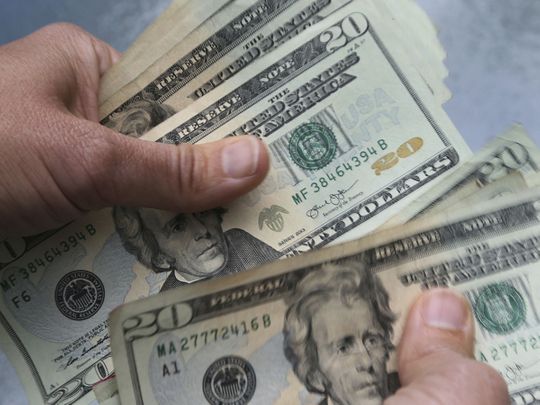
At first, Abbigail Bugenske thought it was a joke - maybe even a scam.
A man had called from a number she didn't recognise and introduced himself as Mike DeWine, governor of Ohio.
"I thought it was a prank call," Bugenske told The Washington Post on Thursday, one day after her phone lit up and her life changed. "To make it even crazier, he said I had won a million dollars, so I definitely thought it was a prank call."
Turns out, he was serious: The caller was indeed DeWine, and Bugenske was one of the first winners of the state's Vax-a-Million lottery, a plan devised to drum up more interest in coronavirus vaccines.
"That was my very first notification that I was about to be a millionaire," said Bugenske, a 22-year-old resident of Silverton, near Cincinnati.
The lottery, one of a slew of vaccine incentive programs in cities and states across the country, also awarded on Wednesday a full-ride scholarship for an Ohio public university to eighth grader Joseph Costello. In all, the program will dole out $1 million prizes to five vaccinated adults and scholarships to five vaccinated teenagers.
At a virtual news conference Thursday morning, Costello, flanked by his parents, said he's "very excited." His mother, Colleen Costello, was stunned when she answered DeWine's call.
"I was really thankful at that moment that there was a bench nearby," she said, "because I needed to sit down."
Ohio's rollout started something of a trend as states seek to rejuvenate flagging inoculation rates - and perhaps engage in a bit of one-upmanship. California, the most recent to announce such a scheme, will hold 10 drawings of $1.5 million each. While some have balked at officials resorting to seven-figure prizes to convince Americans to take a potentially lifesaving vaccine, research has shown that cash incentives may make the unvaccinated more likely to get their shots.
"We're more than happy with the results," DeWine, a Republican, said at a news conference this week. "This was just so important to our future as a state, our immediate future and our long-term future. Having more people vaccinated really allows us to get back to normal."
Costello's parents said they were fully vaccinated and had planned to get their children vaccinated by the end of the month. The lottery announcement, they said, prompted them to move the appointments up.
Bugenske, however, signed up for her jab as soon as she was eligible. Registering for the lottery when it was announced was "a win-win" she said, but she forgot about the drawing soon after - that is, until about five minutes before it was announced on live TV, when DeWine called.
Long before, Bugenske had urged her grandmother, who is in her 70s and lives in Michigan, to get the shot quickly as possible.
"She encouraged me all the time to get it," Karen Bugenske said of her granddaughter. She added that she had never been opposed to the vaccine, but "wasn't in any hurry for it."
"I would've gotten it," she said, "but they wanted me to get it yesterday."
In the end, she got both her Moderna shots and called her granddaughter with the good news.
"Having the deadlines for the Vax-a-Million is the same thing," Bugenske said. "You just need someone to say, 'Don't put it off, just go and get it."
Abbigail Bugenske graduated from Michigan State in 2020 and began working at GE while studying for a graduate degree in aerospace engineering at Ohio State University. She has no plans to quit her job, she said, and after donating some of her winnings to charity, she'd like to invest.
"It's been less than 24 hours," she said. "This still hasn't processed for me."
She got the news while on her way to Cleveland to shop for a used car. She plans to go through with the purchase, rather than seek an upgrade.
"No, I'm not looking to buy a Ferrari," she said.
Nationwide, the race to get as many people vaccinated as quickly as possible has taken on new urgency as more states continue to relax their pandemic-era public health measures.
About half the US population has received at least one dose, but the average number of shots administered per day has fallen about 36 per cent in the past month to 1.75 million.
In Ohio, 45 per cent of residents have received at least one dose, a metric that slightly lags behind the nation overall. But officials insist the state would be in a worse place without DeWine's high-profile giveaway initiative. Five days after its rollout, the Ohio Department of Health said the campaign had driven a 28 per cent increase in the vaccination rate of those 16 and older.
However, in the past week, the state's overall vaccination rate has fallen by about 3 per cent.
The White House has praised the plan and during an appearance in Cleveland on Thursday, Biden applauded it again.
"Ohio has a new millionaire!" Biden said. "I tell you what, who wouldathunk it, a million bucks for getting a vaccine? But it's working."








